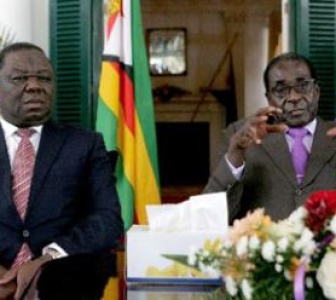
REPORTED incidences of political violence ahead of the referendum on the draft constitution and thereafter elections, is a seriously worrying development. It is even more disturbing in that it flies in the face of the principals’ bold pronouncements that this time around elections would be violence-free. Report by John Makamure
It makes one wonder whether the principals are still in charge of the politics in this country or that there are other powerful forces that determine the course of the electoral process and hinder people from freely expressing their political will.
What is also of major concern is that laws put in place to deal with political violence are not being enforced. The Electoral Amendment Act and the Zimbabwe Human Rights Commission Act contain provisions aimed at curbing political violence before, during and after elections.
These laws were last year passed by Parliament and assented to by the President. Their enactment was celebrated as a major milestone in the fulfilment of some of the Global Political Agreement provisions. It is, however, disappointing to see that the laws are gathering dust. It will not be surprising to see the new Constitution (when approved at a referendum and signed into law by the President) suffering a similar fate as those that control the political levers disregard it with impunity.
Part 18b of the Electoral Amendment Act comprehensively articulates measures against politically-motivated violence and intimidation. The Fourth Schedule of the Act is the Code of Conduct for political parties that they must adhere to in order to curb politically motivated violence. Section 133g is clear that every office-bearer of a political party that is contesting an election, and every candidate and election agent shall take all appropriate measures to prevent politically-motivated violence and any electoral malpractices before, during and after the election period.
The section also requires office-bearers of a political party to take effective steps to discipline all members of the party who engage in politically-motivated violence or who commit any electoral malpractice before, during or after the elections. Whenever called upon to do so by the Zimbabwe Electoral Commission, office bearers shall publicly undertake to abide by the code of conduct for political parties and candidates set out in the Fourth Schedule of the Act.
The Electoral Amendment Act requires the Zimbabwe Human Rights Commission, in consultation with the Zimbabwe Electoral Commission to establish a special investigation committee for each provincial centre to be chaired by a Zimbabwe Human Rights commissioner or a commission staff member. This committee comprises the special police liaison officer for the province and two representatives of each political party contesting the election. The committee’s mandate is to expeditiously investigate all cases of politically-motivated violence for prosecution.
A court which convicts a person of an offence involving politically-motivated violence or intimidation committed during an election period may, in addition to any other penalty it imposes on the convicted person, prohibit him or her from campaigning or taking any further part in the election. Where a person has been prohibited from campaigning or taking any further part in an election, that person shall not, during the election period, attend or address any meeting of a political nature at which more than three other persons are present; or encourage, urge or persuade any other person to cast his or her vote in the election for a particular political party or candidate.
- Chamisa under fire over US$120K donation
- Mavhunga puts DeMbare into Chibuku quarterfinals
- Pension funds bet on Cabora Bassa oilfields
- Councils defy govt fire tender directive
Keep Reading
Any person who contravenes this provision shall be guilty of an offence and liable to a fine not exceeding level six or to imprisonment for a period not exceeding one year or to both such fine and such imprisonment.
It is against this background that I call upon Parliament, through the relevant portfolio committee, to take an active interest on issues to do with political violence and the security of the person.
It is pleasing to see that the new Constitution now empowers Parliament to oversee the security sector. Section 207 (2) says: “The security services are subject to the authority of this Constitution, the President and Cabinet and are subject to parliamentary oversight.”
The relatively wider political space in Zimbabwe should see traditionally non-securocratic institutions – including Parliament, the Auditor-General, the Accountant-General, the Zimbabwe Human Rights Commission and civil society think tanks – playing critical roles in the governance of the security sector. A strong Parliament is one that exercises oversight on the security sector without fear or favour. We cannot have elections without guarantees for the security of the person and vote.
John Makamure is the Executive Director of the Southern African Parliamentary Support Trust writing in his personal capacity. Feedback: [email protected]











